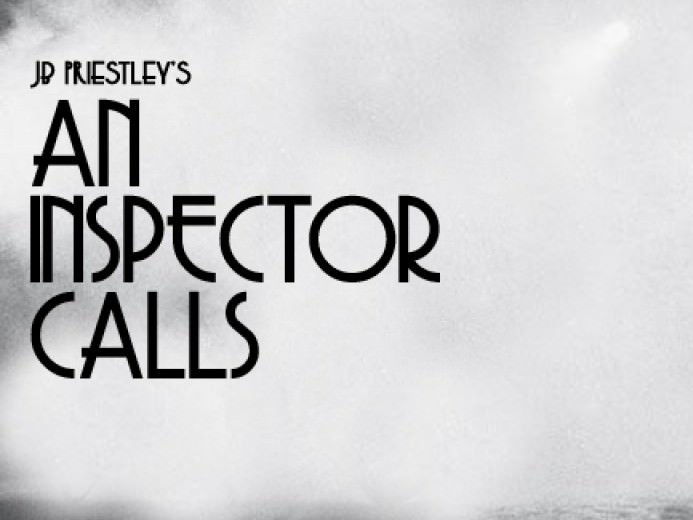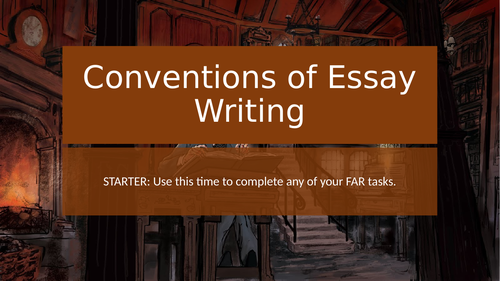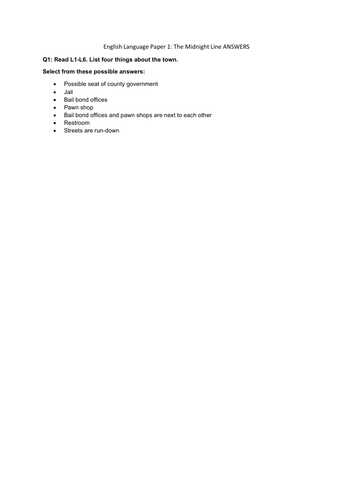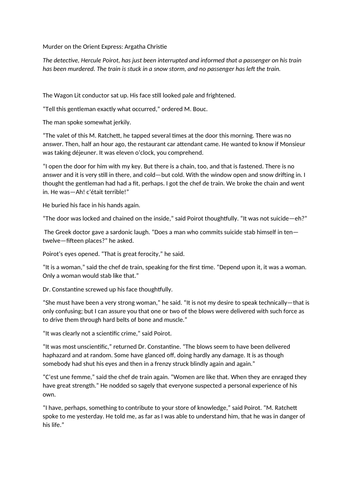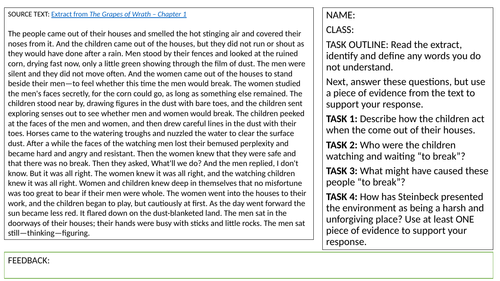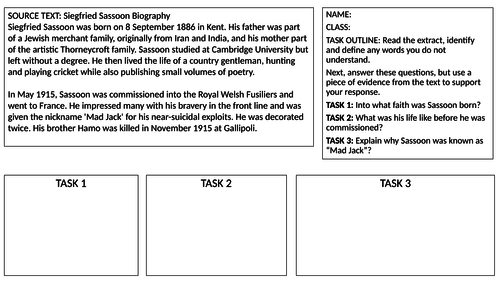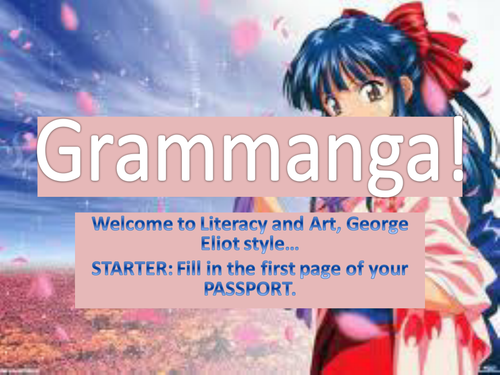
228Uploads
549k+Views
1367k+Downloads
All resources
Sale

AQA English Literature Paper 2 Modern Texts: An Inspector Calls (Higher ability student focused)
A series of lessons that I taught to top set KS4 students. Please note, the gaps between the first and fourth lessons are intentional as I had the students act out the play and answer the comprehension questions in the AQA Study Guide book.
Sale

Spell Quest - making spelling fun
A summer spent playing word games with my kids lead me to this idea.
The idea is that the students are supplied with a grid of letters. They use these letters to build words which cause damage to a cartoon monster. The bigger the word, the more damage done to the monster.
I’ve made it more and more difficult as the monsters develop - you have to use certain letter types for example.
I plan to give each child one grid per week to complete and have their peers mark it.
So you are completely aware, I have left all of the grids blank apart from on a few. You will need to fill these in yourself. Also, I have left the challenge component blank too. This will allow you to create challenges that reflect the specific types of spellings you are looking at - double damage awarded for homophones for example.
There’s massive scope for differentiation in here too. I’ve included a whole class version of the spelling levels, as well as a photocopy friendly version too.
I have long believed that making school a little more like computer games can be helpful - this is my first attempt at exploring Gamer Theory as I have dubbed it.
Watch this space for more. Have to figure out how to do something similar with the other components of SPAG and Reading now…
ADDITION: I’ve included some completed versions of the pack to give you an idea of what they could look like. Pay attention to the NOTES section of the power points too. These grids have been designed to be used in tandem with the Escape From Kraznir scheme of work.
ADDITION: I’ve also added a new powerpoint that works as a whole class exercise. You don’t need the sheets, just paper and the will to go on…
Sale

AQA English Literature: Macbeth
A collection of resources designed to support the teaching of Macbeth at GCSE level. The lessons assume that the class will be “acting” out the play, using the summary as a stimulus for the acting out element. I interspersed this acting with numerous directions to read the text aloud; overall, the students enjoyed this combination of normal language and Shakespearean.
It has always been my way to establish an initial understanding of a Shakespearean text before trying to wade through the language.
Hopefully, this will prove a useful starting point.
Sale

AQA English Language PAPER 1 Creative Writing Tasks/Resources
Three slides on a power point that can easily be printed out and handed out as a task. Each slide gets progressively more complex. Each slide contains a choice of two tasks (one descriptive and one relating to the writing of a narrative), a punctuation related challenge, a content challenge and an organisational challenge.
Ran it with my year 11s yesterday and they found it very useful.
Oh yes! I have intentionally put one spelling/punctuation mistake on each slide with the idea that I award a housepoint to the first student that identified it. You’re welcome!
Sale

AQA English Literature - A Christmas Carol: Complete Unit of Work
The lessons are designed to tie in specifically with the Scholastic Classics version of the text OR the Collins Classroom Classics version, but it wouldn’t take too much to use this with any version to be honest.
Visually, the powerpoints are designed to be eye-catching. Each one is loaded with links to videos, layered with animations and suitably spooky xmas music.
The lessons are ordered via number for your convenience. There is a specific focus on each of the GCSE Assessment Focuses, starting with AO3 (It makes sense, to me at least, to contextualise the story prior to reading it).
The stave lessons each contain definitions of the archaic words (though there is a definite backing off with this the further in you get: as the students get more familiar with the language, they’ll need less prompting with decoding it), as well as a particular focus on key quotations. There are comprehension questions layered throughout, and the first THREE of the stave lessons have an ending task that links to a type of question found in AQA English Language Paper 1 Section A - my class had previously focused on this unit and it made sense to me to keep these skills “hot” so to speak.
The AO specific lessons tie in with the Assessment Objectives for the English Literature course. The AO1 and AO2 lessons assume that the students have read the entire text.
Finally, the theme lessons build towards the students sitting a GCSE Literature style assessment.
I have sourced a lot of ideas from the following pdf file - I wouldn’t feel comfortable trying to pass these ideas off as my own; I include the link so that any person might have the benefit of this resource without having to pay for mine:
http://drbacchus.com/files/christmas_carol/glossary.pdf
There’s about 30+ hours worth of teaching materials in here; enjoy!
Sale

AQA English Language P2: Section B (using A Christmas Carol)
A series of lessons designed to make sure students have a clear understanding of the “basics” and the “developed” skills and techniques required for EACH of the possible text types they could meet in Section B of the English Language Paper 2 exam. Because my lot were taught A Christmas Carol (and I was trying to kill two birds with one stone by revising this at the same time…), the tasks are all focused on writing within the world of Scrooge. To that end, they may require some editing on the part of the user - hence the reduced price.
Sale

AQA English Language Paper 1 MOCK EXAM: The Midnight Line (Jack Reacher)
I’ve used the opening chapter of the novel as the basis for an AQA Language Paper 1 mock exam. I’ve created an Answer paper too.
Sale

AQA English Literature: Romeo and Juliet Method Focus Essay Builder
Similar to a lesson I posted on A Christmas Carol. After a bit of a warm-up, the crux of the lesson is focused on establishing concepts then explicitly showing students HOW to identify methods - again, some still confuse quotations and methods - before pointing them at an exam question.
UPDATE: I repeated this lesson a few weeks later with a different extract, but backing off a notch in terms of explicitly identifying methods.
Sale

Universal True or False Spreadsheet/Worksheet Generator
An easy to use spreadsheet where you build a bank of true or false statements (tab 3) which will then create a randomly generated worksheet of ten true or false statements (tab 1). Additionally, an answer sheet will be generated too (tab 2) allowing for the resource to be used in a whole class setting.
All you need to do is populate the spreadsheet with true/false statements and then identify which statements are true, and which are false.
Instructions are built into the spreadsheet itself.
Sale

AQA Power and Conflict Poetry True or False Statement Generator
A useful little resource that can be a starter/plenary element in your lessons. The spreadsheet generates ten randomly selected true or false statements from a bank of over 260. Each of the power and conflict poems is covered and there is the scope for you to add in your own or edit the statements that are there.
I released this to my year 11s as a revision tool and they found it very useful.
Additionally, I have included a blank copy of the spreadsheet so you can create your own ToF statement generator.
Bundle Sale

AQA GCSE Curriculum
Every scheme of work that I’ve made that could be used to teach AQA English Language and AQA English Literature
Sale

AQA Power and Conflict BATTLE CARDS
As part of my quest to engage students with the 15 Power and Conflict poems, I’ve come up with these Battle Cards. Essentially, the idea is to promote AO1 and AO2 related discussions that get the students to recall what they know about the poems they have been taught without having the actual poem in front of them.
The students “score” each of the poem against a number of POWER and CONFLICT related areas. This is recorded on an A5 sized BATTLE CARD where they can draw supporting images(good for recall) and identify methods, key quotations and themes.
The idea is for students to battle one another and use the cards as the stimulus point for the discussion. Whoever is best able to justify the score they have given for their card wins the round.
I’ve included a blank card along with 15 poem specific cards (each of these has a supporting back ground image, but is the same as the blank card in all other respects).
Sale

KS3: Murder on The Orient Express Language Task - Method Focus
Using a format that proved successful in the KS4 arena, I’ve adapted the thinking to apply to an AQA English Language P1 Q2/P2 Q3 style task that would fit for a higher ability top set KS3 class.
The approach is to initially read the extract then to specifically identify concepts that relate to a language focused task, followed be explicitly identifying language based methods and incorporating into a response.
Sale

KS3: SPaG Understanding a Text Lessons (Focusing on John Steinbeck)
Designed to be taught in support of a Year 9 class doing a GCSE-style task on Of Mice and Men. These powerpoints make good activities as part of a lesson, or they can be printed off as individual worksheets. The worksheet element contains a RAG rating system and some generic targets, suited for peer or self assessment.
Sale

Punctuation vs Teachers: Tracking punctuation skill progress and making it fun(ish...)
A series of activities that are designed to be taught over time. There is a bit of initial leg-work to do in setting up the spreadsheet and, truth be told, I’ve had more success using this with smaller classes than with larger ones - the volume of specific data generated gets unwieldy with the larger groups.
So, I’ve divided punctuation up into three groups - BASIC, MID-RANGE and ADVANCED. The idea is that you teach/go over/re-demonstrate the type a type of punctuation. Then, the students are given ten minutes to write where they focus on using that type of punctuation. Each punctuation type has a points value, and the goal is to “defeat” a possessed teacher by using that type of punctuation. The powerpoint presentations each show a teacher (or a combination of teachers) making their way across the screen over the course of ten minutes. There’s the option of spooky orchestral music too.
There are specific work sheets that each student will need - each work sheet contains the points value of each punctuation type and a grid where you can wither self/peer/teacher assess depending on how you want to set the lesson up.
As the class progresses, so to does the complexity of the task. Each new level incorporates a new type of punctuation OR (more importantly) a new combination of focuses. For example, level 3 requires students to use BASIC and MID-RANGE punctuation to defeat two teachers.
What I found useful was the specific nature of the feedback I got: I could see quite clearly which punctuation types were defeating each student and which punctuation type was an issue for the class as a whole. And, if the class lost (which they did on more than one occasion) then they retried the level the following week.
We used this in SPAG lessons in combination with some other elements - it can easily be made into a whole lesson.
A useful little tool…
Sale

KS3: SPaG Understanding a Text Lessons (Focusing on WW1 poets and their background)
This uses a format I’ve used elsewhere. The lessons are designed to support the teaching of conflict poetry from WW1. The goal is that the students sharpen their reading skills and get a boost in their English lessons where the poet is the subject of focus.
Sale

KS3: Born a Crime - Structure Focus
A lesson take from a collaborative scheme of work. The lesson focuses on the quite excellent Born A Crime by Trevor Noah. The focus is developing an initial understanding of South Africa, then Trevor Noah himself, before focusing in on the context surrounding the story itself.
After, the focus switches to analysing the structural choices made in the extract.
Additionally, I’ve included a useful little follow up lesson where the focus ins to build a piece of creative writing that follows a specific structural path.
Sale

Creative Writing: Experimental poetic forms
I enjoy teaching this lesson in and around poetry units of work. Essentially, it demonstrates three different approaches to creating poetry, culminating in the students creating their own Shakespearean Sonnets (you'll struggle to get this done in a single lesson - I designed this for a double period).
You'll need the following to complete this lesson:
2 different coloured paper types
Glue
Scissors
The students to have prior knowledge of the Shakespearean Sonnet Form
Enjoy.
Sale

Transitional Lesson: KS2 to KS3
One of my old schools did a great job of communicating with their feeder Primary Schools. We would be invited in to teach the incoming Year 7s. We took this a stage further by collaboratively teaching lessons with people from other departments. This lesson is designed to be taught to Year 6 students and combines Art and English. It's quite easy to change this to meet the needs of your own school's transitional needs.
You'll need to download some Manga style pictures and also, somewhat unsurprisingly, you'll need Art resources too.

